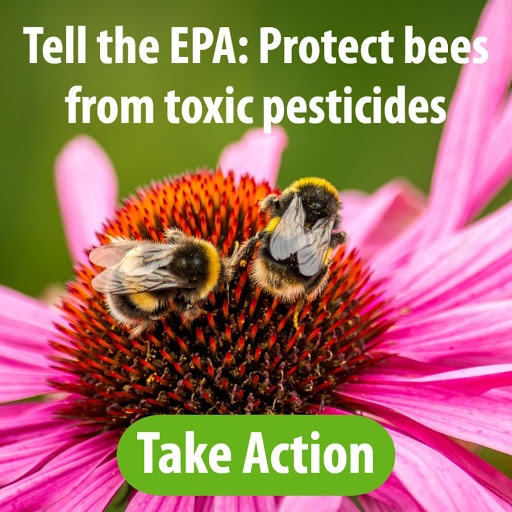
Dear Anonymous,
The Trump administration's Environmental Protection Agency (EPA) is considering reauthorizing the use of a class of bee-killing pesticides.1
The pesticides in question, called neonicotinoids, attack bees' central nervous systems, causing neurological damage and paralysis.2 Recent research has also found that baby bumblebees' brains are permanently and irreversibly damaged by feeding on pollen and nectar contaminated with neonicotinoids.3
The good news is that we have an opportunity this Earth Day to stand up for bees. The EPA is accepting public input on its decision until May 4.
Thank you for all you do,
Hannah Collazo
State Director
P.S. Our work to defend the environment can't stop and won't stop in the face of the coronavirus pandemic. We'll keep advocating on your behalf -- at a safe social distance -- for clean air, clean water, clean energy, wildlife and open spaces, and a livable climate.
1. "EPA Releases Proposed Interim Decisions for Neonicotinoids," United States Environmental Protection Agency, January 30, 2020.
2. Stephen Leahy, "Insect 'Apocalypse' in U.S. Driven by 50x Increase in Toxic Pesticides," National Geographic, August 6, 2019.
3. Katie Hunt, "Pesticides damage the brains of baby bees, new research finds," CNN, March 3, 2020.
---------- Forwarded message ----------
From: Environment Colorado <[email protected]>
Date: Thu, Apr 16, 2020
Subject: This pesticide is damaging baby bees' brains
To: Anonymous Donor <[email protected]>
 |
Dear Anonymous,
Bumblebees are in trouble.
Baby bees that eat food contaminated with pesticides called neonicotinoids (or neonics) experience permanent and irreversible brain damage. This makes these bees poorer at learning, foraging and returning to the hive as young adults.1
The solution to protecting baby bees from this fate is simple: It's time to ban the worst uses of neonics.
A new study found that young bees' exposure to neonics caused parts of the brain to grow less. Later in life, these bees had impaired brain function, and experienced difficulty foraging for food and returning to the hive. The researchers also concluded that neonics are a leading cause of global bee declines.2
And this science is just the latest documenting neonics' adverse impacts on bees. Previously, neonics were found to poison bees' central nervous systems, altering behavior and increasing susceptibility to disease.3
Anonymous, it's not too late for bees. Take action.
Under federal law, the EPA is required to review all registered pesticides every 15 years to make sure they don't cause unreasonable harm. This gives us the opportunity to show the EPA the science and urge it to respond with real protections for pollinators.
The EPA is currently accepting public input on the decision to reapprove neonics, and it's obligated to review and consider comments. By adding your name, you'll help build the necessary support to convince the EPA to protect pollinators from toxic pesticides.
Thank you for all you do,
Hannah Collazo
State Director
1. Katie Hunt, "Pesticides damage the brains of baby bees, new research finds," CNN, March 3, 2020.
2. Katie Hunt, "Pesticides damage the brains of baby bees, new research finds," CNN, March 3, 2020.
3. "Harm," The Task Force on Systemic Pesticides, last accessed February 12, 2020.
Donate today. A cleaner, greener future is within our reach. Your donation today can help us bring the vision we share a little closer to reality.
Environment Colorado, Inc.
1543 Wazee St., Ste. 400, Denver, CO 80202, (303) 573-3871
Member questions or requests call 1-800-401-6511.
Facebook | Twitter
If you want us to stop sending you e-mail then follow this link -- Unsubscribe
